Oskar Gottlieb Blarr | |
|---|---|
 Blarr in 2001 | |
| Born | 6 May 1934 Sandlack, Germany |
| Occupations |
|
| Organizations | |
| Website | blarr |
Oskar Gottlieb Blarr (born 6 May 1934) is a German composer, organist, church musician and academic teacher.
Oskar Gottlieb Blarr | |
|---|---|
 Blarr in 2001 | |
| Born | 6 May 1934 Sandlack, Germany |
| Occupations |
|
| Organizations | |
| Website | blarr |
Oskar Gottlieb Blarr (born 6 May 1934) is a German composer, organist, church musician and academic teacher.
Blarr was born in Sandlack near Bartenstein (East Prussia). The Gothic church with its Baroque organ fascinated him early on; he began to form a lifelong love for organs. [1] Blarr and his family fled to West Germany in 1945. [2] He wrote his first compositions at the age of 12. He studied church music from 1952 at the Kirchenmusikschule in Hannover, percussion at the Musikhochschule Hannover, and composition with Heinrich Spitta. [3] He continued his studies, conducting with Dean Dixon and Herbert von Karajan in Salzburg, composition with Bernd Alois Zimmermann in Cologne, Krzysztof Penderecki at the Folkwang-Hochschule in Essen, and Milko Kelemen and Günther Becker at the Robert Schumann Hochschule. [1] He was the church musician of the Neanderkirche in Düsseldorf from 1961 to 1999. [3] He also lectured there at both the Katechetisches Seminar and the Robert Schumann Hochschule from 1984. [2]
Blarr composed four oratorios about the life of Jesus, four symphonies, chamber music and works for organ. [4] He also set many songs of the genre Neues Geistliches Lied to music, some of under the pseudonym Choral Brother Ogo. [5] His organ works were recorded with organists Wolfgang Abendroth and Martin Schmeding. He was a member of the ecumenical Textautoren- und Komponistengruppe der Werkgemeinschaft Musik e.V. and the association Musik in der Ev. Jugend (now: Textautoren- und Komponistengruppe TAKT.
![Blarr at the piano in the Ascension Church [de] in Jerusalem in 2009 OskarGottliebBlarr.jpg](http://upload.wikimedia.org/wikipedia/commons/thumb/d/df/OskarGottliebBlarr.jpg/220px-OskarGottliebBlarr.jpg)
Blarr visited Israel to experience where Jesus lived as a Jew. [6] In 1983, the Israeli composer Josef Tal dedicated his organ work Salva Venia to Blarr, who premiered it the following year in Düsseldorf. In 2016 he was awarded an honorary doctorate by the University of Warmia and Mazury in Olsztyn. [1]
The German National Library holds four works authored by Blarr, and 168 compositions, as of 2017: [7]
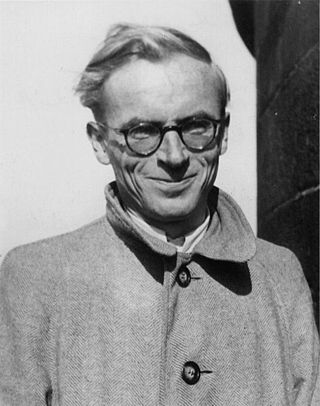
August Hugo Distler was a German organist, choral conductor, teacher and composer.
Wolfgang Friedrich Rübsam is a German-American organist, pianist, composer and pedagogue.
Hermann Schroeder was a German composer and a Catholic church musician.

Ernst Pepping was a German composer of classical music and academic teacher. He is regarded as an important composer of Protestant sacred music in the 20th century.
Johannes Wolfgang Zender was a German conductor and composer. He was the chief conductor of several opera houses, and his compositions, many of them vocal music, have been performed at international festivals.
Volker David Kirchner was a German composer and violist. After studies of violin and composition at the Peter Cornelius Conservatory, the Hochschule für Musik Köln and the Hochschule für Musik Detmold, he worked for decades as a violist in the Radio-Sinfonie-Orchester Frankfurt. He was simultaneously the violist in the Kehr Trio founded by his violin teacher Günter Kehr, and a composer of incidental music at the Hessisches Staatstheater Wiesbaden.
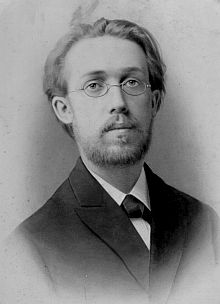
Waldemar Edler von Baußnern was a German composer and music teacher.

Kurt Georg Hugo Thomas was a German composer, conductor and music educator.
Karl Höller was a German composer of the late Romantic tradition.
Martin Schmeding is a German church musician, concert organist and academic teacher, who has made recordings of the complete organ works by composers such as Brahms, Mendelssohn, Franz Schmidt, Max Reger and Tilo Medek.
Peter Janssens was a German musician and composer who wrote and performed incidental music for several theatres, and songs and musicals of the genre Neues Geistliches Lied, a pioneer of Sacropop. He worked at a German theatre in Buenos Aires, set several works by Ernesto Cardenal to music and composed in 1992 a passion music, in memory of 500 years after the European invasion in Latin America.

The Neanderkirche is a Protestant church in the centre of Düsseldorf, the Altstadt. The building in early Baroque style was completed in 1687 and later named after the Reformed minister and hymn writer Joachim Neander. It is now a parish church of the Evangelische Kirchengemeinde Düsseldorf-Mitte. In 1965, a Rieger organ was installed, which is also used for a series of summer concerts.
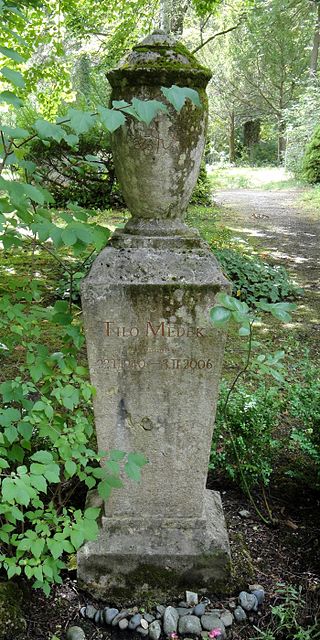
Tilo Medek, originally Müller-Medek, was a German classical composer, musicologist and music publisher. He grew up in East Germany, but was inspired by the Darmstädter Ferienkurse. He composed radio plays and incidental music. His setting of Lenin's Decree on Peace led to restrictions, and after he showed solidarity with the expatriated Wolf Biermann, he also had to move to the West, where he composed an opera Katharina Blum based on Heinrich Böll's novel, and worked in education. He received international awards from 1967 onwards.
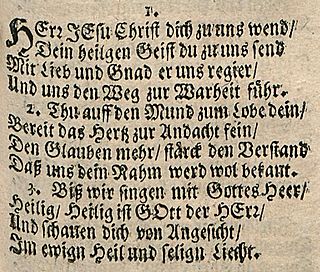
"Herr Jesu Christ, dich zu uns wend" is a Lutheran hymn from the 17th century. Its hymn tune, Zahn No. 624, was adopted in several compositions. It was translated into English and is part of modern hymnals, both Protestant and Catholic.
TAKT is a group of writers and composers of new songs for use in Christian churches, initiated in 1947. The genre which the members promoted was later called Neues Geistliches Lied. The name is short for TextAutor/innen- und Komponist/innen-Tagung, a name that the group adopted in 1997.
Helmut Bornefeld was a German Protestant church musician, composer, Orgelsachverständiger, and writer.
Manfred Weiss was a German composer especially of symphonies, concertos and vocal music, based in Dresden. He taught composition and music theory at the Hochschule für Musik Carl Maria von Weber from 1959, as professor from 1983 to 1997, influencing generations of composers, and instrumental in the restructuring of the music department after the German reunification.
Willi Vogl is a German composer, clarinetist and college scholar.
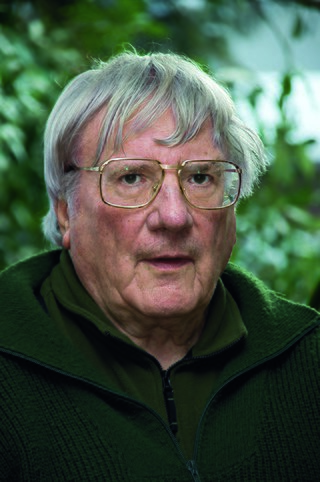
Alfred Koerppen was a German organist, music pedagogue, composer and academic teacher. He taught composition and music theory at the Hochschule für Musik und Theater Hannover from 1948 to 1991. His compositions focus on choral music with and without accompaniment, but he also wrote symphonies, chamber music and stage works.
Silvia Hauer is a German operatic mezzo-soprano. A member of the ensemble of the Hessisches Staatstheater Wiesbaden since 2015, she has performed leading roles such as Cherubino in Mozart's Le nozze di Figaro, Rosina in Rossini's Il Barbiere di Siviglia, Bizet's Carmen, and the title role in Der Rosenkavalier by Richard Strauss. Her concert repertoire includes Oskar Gottlieb Blarr's Jesus-Passion and Verdi's Requiem.